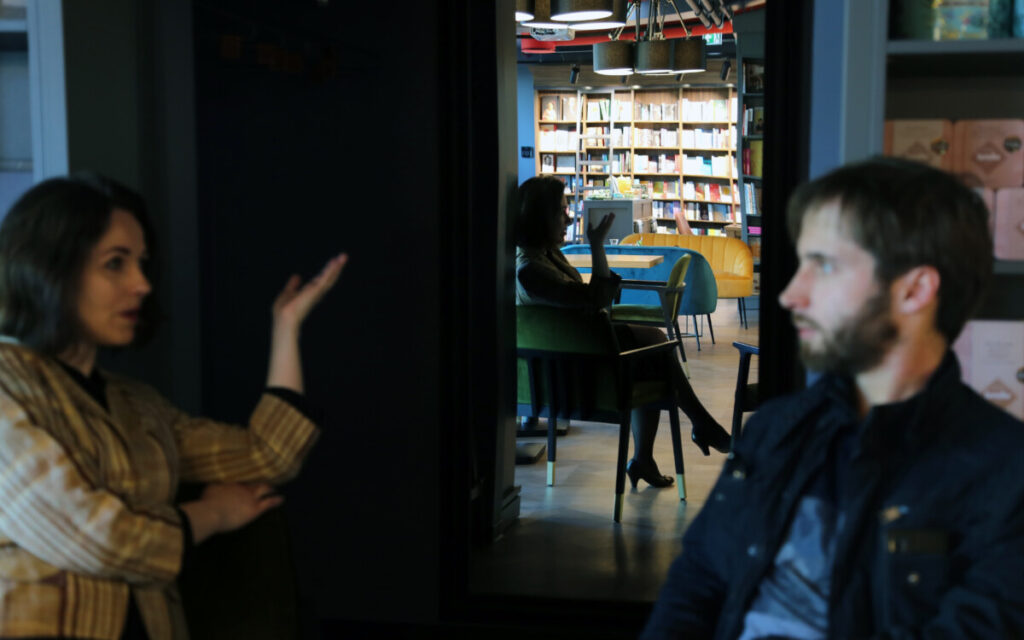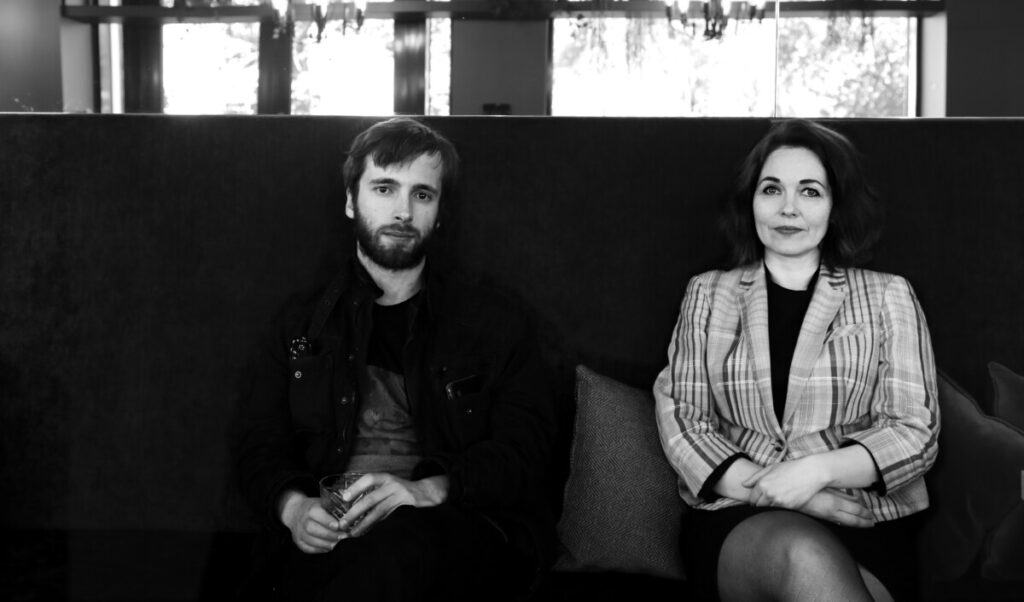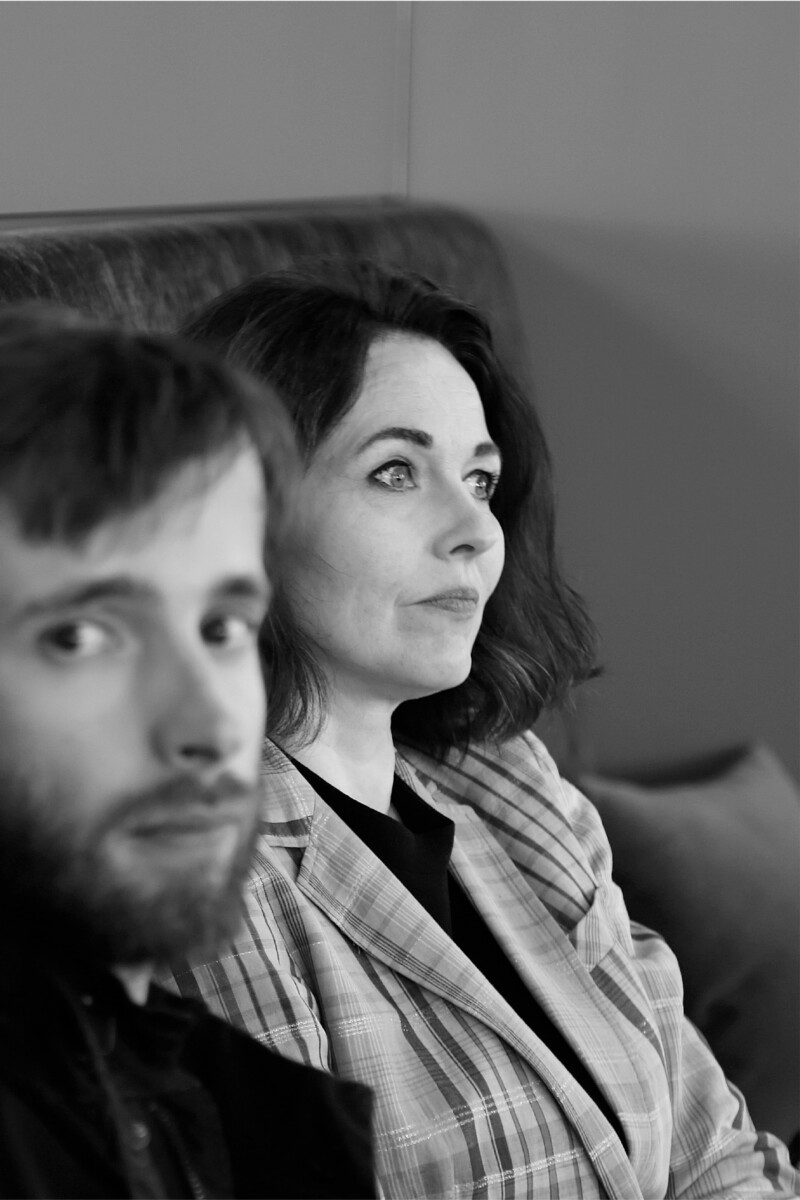Elo Viiding’s debut poetry collection Telg (Axis) was released in 1990; her fifteenth and latest collection Ainult armastusest (Just About Love) in 2019. Kristjan Haljak came into the world in the same year as Viiding’s first collection and made his own debut in time – Palavik (Fever) was published in 2014. His newest poetry collection, Illuminatsioonid (Illuminations), should be released in 2020.
To mark this anniversary year, ELM invited these two colorful poets to sit down and chat about poetry and, naturally, how it has changed over time. Not to mention all the other topics, which matter to them.
Kristjan interviews Elo
It’s been 30 years since your first poetry collection was published. I believe I wouldn’t be off the mark in saying that the purpose and function of poetry has changed to some degree for both you and society over that period. If that is true, then how? If not, then – how?
For me, what’s remarkable is what people agreed with then, and what is common and customary now. For example, when I wrote on social topics nearly twenty years ago – and my poems were often freestanding little statements on the societal climate, dominant morale, mentality, and political situation – I was condemned, ridiculed. I don’t know if that meant life was so wonderful that writing social critique was almost seen as an inappropriate act; that poetry should express something loftier than the mundane and look nobly inward (or be nobly evasive) – we had only just achieved “independence”, etc. Naturally, many authors before me, and contemporaneously with me, wrote on social themes, punk literature, and resistance literature, but apparently I did so in a style that didn’t sit well with readers and critics: I didn’t want to court them with warm humor, but instead tended towards irony, was biting, non-traditional, and that bothered them. One time, I expressed the opinion that poets should receive greater pay for their work when publishers make money off their poems in the run-up to Christmas (i.e. Christmas anthologies on themes of friendship, love, etc.) Demands like those weren’t good form back then. A poet didn’t speak of money.
Today, some of the people who mocked me now approve of the changes. Nowadays, you’re allowed to ask more money for your work! There is even a state writer’s salary, which is basically just a three-year grant and has stirred up so much commotion, as if it were an award.
There are never any big sums in literature. And it goes without saying that an author is paid the same amount for several months of work as, for example, what a car repairman, bank teller, or even a teacher receives in a month. Poetry and quality literature, as a whole, were like a charity before (and still are now, to an extent, if you look at the fees paid to authors); they’ve always been somehow loftier than life itself, and that’s just the way they’re treated.
Have there been any times when you’ve felt like poetry doesn’t work? Like you no longer have the desire, need, or urge to write another poem?
Of course there have been times when I’ve felt it doesn’t work, but for some reason I always still feel a need to write. At moments like those, I pick up a poet who is very special to me – currently, I’ve been reading Paavo Haavikko exclusively. I managed a project to translate his poetry into Estonian, which followed another project I directed to publish Pentti Saarikoski in translation. That sense is fleeting. To me, Haavikko’s “field of possibility” is exceptionally motivating. It puts my own writing to work, so to say.
A poet’s ethics, their core beliefs, which I can perceive in the air, matter more to me than their linguistic acrobatics or the transparent tricks they use to try to gain popularity.
I like the way you occasionally poke fun at the “role” of the poet – or at least a certain romantic, bourgeoise myth of the poet wound up in alcoholism, degeneration, and practicing a bohemian lifestyle. Would you agree with the argument that society means to domesticate rebellion by way of that image or myth – i.e. the poet becomes a fool, an eccentric, whose words and acts aren’t to be taken seriously?
Thank you. I do agree.
One thing that’s always bothered me at literary festivals is this: whereas an actor’s high point is taking the stage at an exact time, writers are thoroughly exhausted before performing. Tote bags slung over their shoulders, they’re forced to traipse from one venue or hotel to another, chat with the organizers, eat and drink right before their performance, wrestle with faulty microphones and nonexistent lighting, and worst of all, listen to others before their own turn at the mic, because etiquette states that you have to listen to everyone’s performance, even if it’s tiresome or, let’s be honest, insufferable rubbish.
I very much enjoyed the way things were organized in Oslo when I performed at one of their largest poetry festivals a decade ago, in connection with some of my poems being included in the global poetry anthology Verden finnes ikke på kartet. That experience will stay with me forever.
You were allowed ample personal time, given the choice to dine lavishly alone or with the others, were put up in a luxury hotel (the one where Ingmar Bergman’s favorite room was), were able to do a proper dress rehearsal… And all to truly connect with the audience. After the performance was when you chatted and relaxed, listened to the others, and gave interviews. You were treated with respect; your work was important to the organizers. Everyone knew that you needed peace to focus and sufficient rest to think and get into the right mindset. You weren’t expected to preoccupy yourself with other performances before your own, perspiring and holding your suitcase on your lap! I’m very grateful to the translator Irja Grönholm, who took me to various book fairs and festivals throughout Germany. I’m also grateful to my other translators – Turid Farbregd, Peeter Puide, Katja Meriluoto, Adam Cullen, and the unparalleled Eric Dickens, who sadly passed away. I’m glad they translated my poems because they felt some connection to them – I haven’t been an obligation.
Critics have often noted threads of the psychoanalytical tradition in your works. Has learning the theories of Freud and Lacan, for example, caused you to write differently? And even more importantly, has it changed the way you live your life?

People always search for connections – everything must somehow be tied to their own interpreted existential thread. My life has changed insomuch as I’ve analyzed my actions and reactions in light of those theories; have adapted them to my personal relationships in order to avoid any greater catastrophes. There is simply no other way to interpret your life, childhood, and youth until you’ve come into contact with psychoanalysis. Not everyone needs it. Some people are just doers, analysis would cause them pain. They lack the inclination – simply living is enough.
If one is capable of acting as that machine for themselves (against themselves), then everything is fine. How can psychoanalysis be useful? Certainly not merely for literary games and nurturing self-love, but for liberating yourself of unnecessary emotional bonds, and foremost of naiveties. For being capable of acting for the good of yourself, others, or, ideally, society as a whole. Though one doesn’t have to apply psychoanalysis to reveal simpler naiveties, of course.
Recently, I’ve been distancing more and more from seeing introspection as beneficial. Instead of psychoanalysis, I’m more interested in how a person can realistically act for the good of someone with fewer opportunities, be those spiritual, intellectual, or material. Not society – that’s too narrow of a concept; society is made up of kindred thinkers who generally thumb their nose at others – but rather to do good for those who suffer from abandonment, socially in a certain sense, instead of delving into yourself (and even into ideas). I’m striving to do that in this phase of my life.
Elo interviews Kristjan
Would you be interested in international fame, as much as that is possible in this lovely poetry-poor era? If you were to become world famous, then what topics would you focus on more broadly?
I certainly don’t have to be too worried about unexpectedly acquiring the role of international opinion leader by writing my relatively cryptic and disengaged poems in a language with so few speakers. You couldn’t say it’s happened to any one of my poetic muses during their lifetime. Perhaps the early surrealists… Yet maybe even that was only in retrospect – during their glory days, they still were nothing more than communist henchmen on the political level. Even so, in that type of a hypothetical situation, I don’t believe I’d start writing socio-political poetry more openly than I have already. Maybe in my own little way I would take a stand against ignorance, cruelty, and stupidity, both on the mental and the material level. And I’d promote that mild, soft decadence that dovetails so nicely with the ongoing ecological crisis. And of course I’d fight for love, erotic love, the love that the surrealists tended to call crazy.
Have you edited other authors’ poetry, or would you like to? Or what is your view of the process in general – is it expansive, as a dialogue? Isn’t editing an attack on the core of personality (if we are to acknowledge such a construction?) Does a poet have a defining core in the first place?
I haven’t edited anyone else, though I wouldn’t feel a great aversion to doing so. I edit my own writing for quite a long time and enjoy the process. I’ve also observed that sometimes when you read poems in a slightly different state of mind, it’s possible to notice melodic, symbolic, and structural details that you missed during the initial writing. A long, sound night’s sleep or a couple hours’ walk can be enough to evoke that change in consciousness. At the same time, I have to admit other people haven’t edited my poems very much. I was helped in picking out the poems for my first two books, but no one besides me has had much of a say in it since then. If we were to delve into the topic of personality’s core, it’d get much more complicated and require a longer discussion that weaves in psychoanalytical and philosophical theories. To keep things relatively short, we could play with the idea that there is no core to personality. There’s a space in place of the conceptual core. Still, that doesn’t mean personality or the subject as such doesn’t exist. It does, but it is inevitably contradictory, multi-voiced, elusive. As a result I try to avoid an elite approach, as if the poet were somehow a more complex or perfect, centric or scattered individual than any other – of course, this does also raise the question of who is a poet and what is poetry, but let’s leave that right there for now. I don’t, in any case, believe that a poet necessarily understand themselves, their desires, their motives, or their acts any better. A poet can be just as complex or obtuse as anyone else.
You’ve taught literature and are also involved in translating, literary analysis, and other similar activities. How do these different things interact for you? Do you see a connection between teaching and writing?
I believe that by teaching, you gain an unparalleled opportunity to shape, develop, and educate readers. To give them the codes they’ll need to read the works people tend to see as “cryptic” in the framework of popular discourse. Translating, on the other hand, can be regarded as a form of writing – a translated poem is a new poem; just one to which stricter restrictions apply and the intertextual level of which has been increased to a maximum. Literary analysis – i.e. writing about literature and delving deep into others’ writing – helps you to gain a better sense of your own writing as well; it teaches you to break out of your intuitive conventionalism. I can’t say if it helps you to write any better, but certainly more consciously.

What kind of poetry do you dislike? Is there any Estonian writing that is your credo, so to speak?
Lazy, boring, deficient poetry that tells me nothing new and fails to reshape the old in a way that captivates. Unfortunately, you can find poetry like that everywhere. Good poetry is incredible. Good poetry is equivalent to a religious, psychedelic, erotic experience in the very best and broadest sense. I’m convinced that kind of poetry is possible; that it exists. Otherwise I wouldn’t attempt to write poems in the first place. I should add, of course, that poetry can sometimes appear lazy, deficient, or boring merely because the reader can’t crack the code. This does mean I’ve inevitably got to come to terms with the fact that some of my own poems might appear that way.
You were asked a strange question in one interview – why you published two books in a year. And you apologized, saying it was a fluke because the first book just took a little longer to finish. Do you have a certain work tempo? The experienced ideas or encounters, their processing, writing down the associations – how much time does it take you? Or does time even matter at all? Do you ever think of death?
I’ve contemplated that it’s difficult, if not impossible, to write in extreme states of mind – when you’re either too happy or too sad. Moderate melancholy is said to be the best for writing. That could very well be true. As a result, I can’t say I work at any particular tempo. I certainly write a lot during certain periods, which are then followed by silence; by periods where I write almost nothing except maybe draft poems that look like failures at first. But later, it’s possible for those fragmentary texts, those miscarried intentions to give rise to something provocative. I have several unfinished manuscripts right now, as well, and the one that’s gone into layout and should be published very soon, which was actually started at least five years ago. As for publishing, I reckon that writers should indeed limit themselves to an extent, unfortunately. And death? I do think about death and I believe that good literature, good poetry of every sort should as well; that it should deal with death. It’s all a part of that mystical-erotic experience that I connected to good poetry before. Truth be told, though, I mostly think about life.

